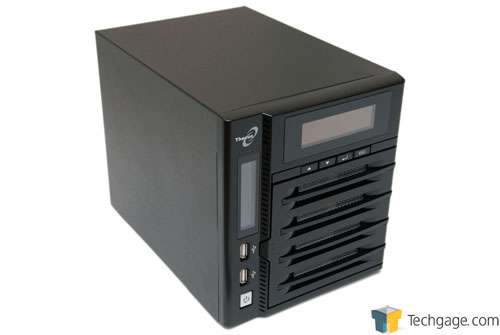- Qualcomm Launches Snapdragon 4 Gen 2 Mobile Platform
- AMD Launches Ryzen PRO 7000 Series Mobile & Desktop Platform
- Intel Launches Sleek Single-Slot Arc Pro A60 Workstation Graphics Card
- NVIDIA Announces Latest Ada Lovelace Additions: GeForce RTX 4060 Ti & RTX 4060
- Maxon Redshift With AMD Radeon GPU Rendering Support Now Available
A Quick Look at Our NAS Test Suite; Critique is Welcomed!
After quite a long NAS drought, we’re soon to publish our look at Thecus’ N4200 four-bay offering, which up to this point in our testing is looking good. The last time we published some NAS content, it came courtesy of our networking-guru Greg King, when he looked at Synology’s DS209+. That was over two-years-ago, so to say we’re a bit overdue for more NAS content would be an understatement.
I’ve been meaning to dive more into NAS and external storage content for a while, but due to other workloads, haven’t had much time to dedicate to it. I’m hoping that to change going forward though, as I do enjoy working with these quite a bit, and the N4200 in particular has rejuvenated my interest in them. But before we go live with our first NAS review in over two years, we’d love to know what you’d like to see in our related coverage.
For our performance-related tests, we have a couple of things planned. Starting off, we’ll be doing transfer tests using our 1Gbit network and 20GB projects. Of these, we’ll have both a solid file and folder (~5,000 files), both of 20GB each. We considered also using a 4GB project in addition to use as a burst kind of test, but decided that it made more sense from a testing perspective to use just one large project.
In addition to transferring these files and folders from our test PC, we’ll also be performing copy performance on the NAS itself. We’ll run both our regular transfer and copy tests using RAID 0, 1 and 5 configurations – the latter only if the NAS supports it (eg: 4+ bays).
Aside from straight storage use, a lot of people use their NAS to access and manipulate data without it being on their PC, so we’ll also be running some application tests as well. These include Adobe Lightroom 3.4 (exporting 500 RAW to JPEG), dBpoweramp R14 (exporting 500 FLAC to MP3) and Handbrake (encoding a 1080p MKV to 480p MP4).
Further, in some business environments, virtual machines might need to be run from within a LAN, so we’ll be doing some light testing there with OS boot time, and also application load times and responsiveness. We’ve considered doing these tests with both Windows and Linux, but for the sake of time, we’ll likely stick to Windows 7 as our guest OS platform (with a Linux host).
The final transfer test we have is to copy a large number of files from the NAS to an external USB storage drive, to see how each NAS fares in that regard. Because some NASes are in a sense, full-blown PCs, manufacturers can choose better or worse configurations and USB controllers, so RAID controllers are not the only concern for us.
Like the rest of our content, we want to make sure we cover all of the bases without providing too much information so that the content becomes boring and repetitious. In addition to performance, we’ll tackle all of the important features of each NAS as well, since that’s in some cases even more important. Though we won’t exhaust everything each one offers, we’ll do our best to talk about what’s the most interesting and unique.
For those interested in our testing setup, I’ll take a moment to explain it here. First, we’ll be using Western Digital’s RE4-GP 2TB hard drives (shown above) for use in the NAS box itself, and where transfer tests are concerned, we’ll be transferring those across a 1Gbit/s network from a Corsair Force F160 solid-state drive. To ensure a lack of a bottleneck, the network card being used is Intel’s server-grade I340, while the router is NETGEAR’s WNDR3700, using the latest official firmware.
Aside from the application tests, which require a Windows OS, I’ll be using my personal and highly-tuned Gentoo Linux for the sake of all testing. There are a couple of reasons for this. First is the fact that Linux has a more reliable networking stack, and second, it’s much easier for me to create scripts and perform timed transfer tests. Although the SSD we’ll be using will rid most sorts of bottlenecks to begin with, I’m more comfortable with Linux in general, and use it more than Windows.
Whew, *wipes sweat*, this was a long news post. So, what do you guys think? Do we have room for improvement? Are we spot-on? You have other ideas that we should consider? Please let us know in the below thread, and of course, if there is a particular NAS model you are interested in seeing us test, please let us know and we’ll look into it!






